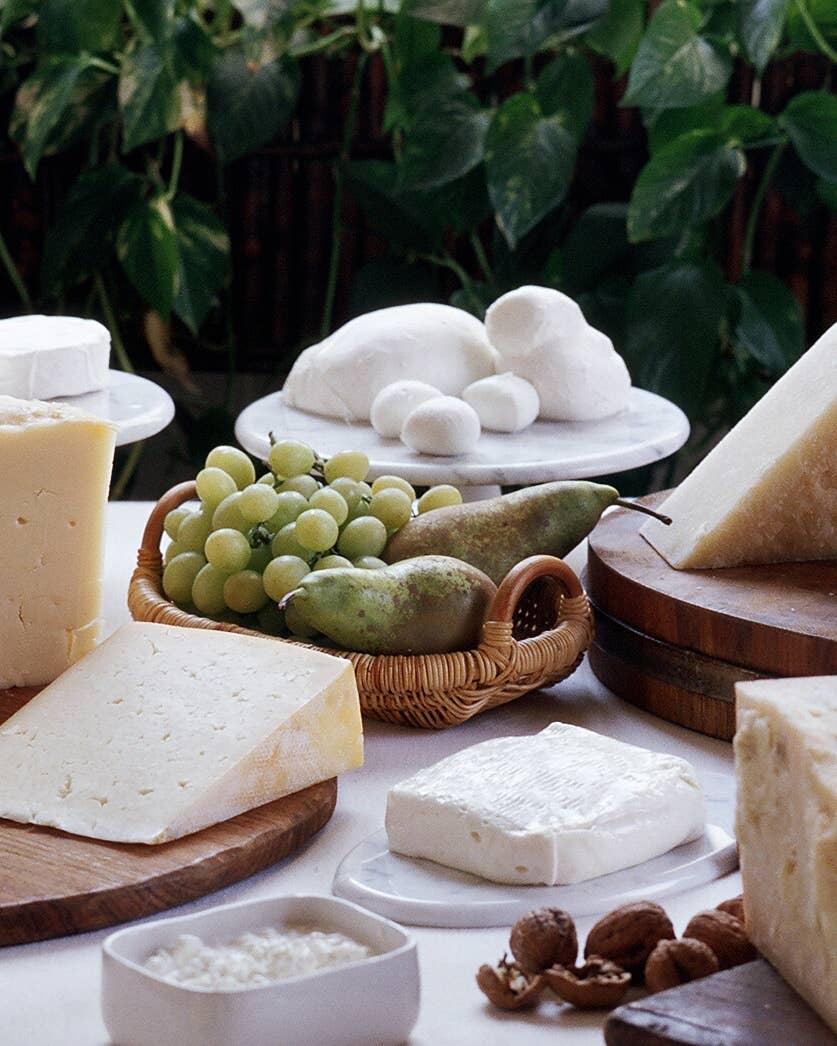
The first real modern American restaurant in Paris opened last December. It's called Verjus, it occupies a sunny triplex space in a 19th-century house overlooking the Palais-Royal, and it's run by New Orleans—born, Boston-bred chef Braden Perkins, 32, and his partner in work and life, Saint Paul native Laura Adrian, 27.
After two-plus decades of living in France, unless someone had told me Verjus was owned by Americans, I'd never have suspected—not upon arriving, anyway—that the owners were anything but French, so perfectly does the mise-en-scene of the white-painted dining room with huge picture windows master the codes of the new wave of young-chef-helmed bistros in Paris (mismatched flea market chairs, bare wooden tables). The service is the tip-off. The young waitresses are friendly but don't want your stress. You'll be served when you're served, so relax. In any event, I'm never much fussed by the service when the food is this good. And it's wonderful, at last, to be in a Paris dining room where there's so much laughter in the crowd noise.
Verjus has been a hit with food-loving anglophone expats like me, and it's also gotten the thumbs-up from a couple of the more incisive young French food writers. One even described the place as having "un vibe tres Brooklyn"—high praise, as young Parisians are currently besotted with the New York City borough they perceive as hip and assiduously gastronomic but unpretentious. Since Perkins revises his two dinner-only tasting menus almost daily (one is four courses, the other, six), his imagination is always sparking. As evidenced by a winter starter of a poached egg with three types of grilled mushrooms (shiitake, button, and a tiny wild Japanese one) on a bed of wild rice with microscopic dandelion leaves and a sprig of dill, his food can be so fragile, intimate, and self-effacing that it induces perfect, fleeting, ego-free moments of Zen pleasure.
If none of the dishes throws flavor bombs or talks too loud, all of them intrigue with impeccable logic and sly intelligence. A perfect example: a dish of pan-seared duck breast cooked rare and served sliced on top of ravioli filled with caramelized red onions, garnished with smoked celery root skin, orange segments, microgreens, and parsley-infused oil. The surprise Perkins teases out here is the nexus between the palates of central Europe and Japan: Duck, red onion, and orange is as Bohemian as can be, but the earthy celery root and small sharp bolt of herbaceousness read ryokan. At least that was my take on this terrific dish. A Parisian at the next table was vocally disconcerted: "Mais c'est bizarre du oignon rouge avec du canard!" ("Red onion with duck is weird!") Overhearing this remark, I thought, You'd never get this kind of guff at Spring, the other well-known Paris restaurant with an American chef. There, Daniel Rose has so diligently assimilated the classic calibrations of the French palate that there's nothing that would gall a Gaul; he's a French-trained chef making French food, however fresh his perspective.
photo by Laurent Chamussy
The first time I ate at Verjus, I was abashed to find myself cast, initially, in the role of the prissy Parisian. The dining room had none of the social and psychic tension of a French restaurant; you just kind of came in and sat down. The atmosphere was so low-key, it reminded me of the peace-and-love, spider-plant vegetarian places I used to go to in Northampton, Massachusetts, when I was a student at Amherst College. Then I remembered I not only like but prefer this social frequency in a restaurant. The first dish was a pair of roasted beets garnished with caraway seeds in a shallow pool of buttermilk; the next was brought out by an earnest young man with Clark Kent glasses, who I guessed was the chef. On that plate was a winter still life of pickled baby leeks with a quail's egg, Israeli couscous, oven-dried radicchio leaves, and a scattering of ash made from the green ends of the leeks. I loved the bitter staccato punctuation of the radicchio on the longer play of caramelized leek, and the little egg oozing into the chewy couscous. Next came a superb rectangle of skillet-cooked salmon garnished with a dab of grilled eggplant puree and salmon roe, with a tofu flan topped by a corsage of tiny mesclun leaves and razor-fine slices of fennel bulb. Worldly, casually sophisticated, sensual, and satisfying, this dish was a brilliant cameo of the best of contemporary American cooking.
After several more meals at Verjus, it became obvious to me that conventional restaurant reviewing protocol—the anonymous writer (which I was) comes for a few paid meals and then slinks away to deliver a verdict—just wouldn't work. There simply wasn't any honest way for me to be blase about the nerviness (shading to audacity) of an American chef deciding to open his first restaurant in Paris.
So I met Perkins for a coffee on a frigid morning in a branch of Le Pain Quotidien, the Belgian bakery chain. I knew already that Perkins had cooked with Seattle chef Tom Douglas for several years before moving to Paris five years ago. Since he'd run the incredibly successful, now-defunct "Hidden Kitchen," a supper club in the Paris apartment he and Adrian share, I assumed he knew what he'd be up against. "What we're doing is unabashedly not a French restaurant," he told me. "Paris is on the receiving end of food trends today, and it makes some people a little uncomfortable, some a little defensive." But if Paris is no longer the global axis of gastronomy, why did he move here instead of, say, Philadelphia? "I wanted the experience of cooking with French produce," he said. "What's cool is democratizing good food, taking it down from the pedestal where the French expect to find it. Too often in France, the best food is humbled by antagonistic hospitality and an uptight atmosphere."
photo by Laurent Chamussy
Before the puckishly named Verjus—verjus, bien sur, is the juice of unripened grapes; this handle was inspired by the restaurant's youth relative to the long-running Anglo-owned Paris wine bars of two of Perkins's friends and neighbors, Mark Williamson of Willi's Wine Bar and Tim Johnston of Juveniles—my experiences of soi-disant American food in Europe had always been cringe making. Only last summer, the best and most famous food writer in France wrote an article about American food that was a hailstorm of stereotypes, upbraiding our eats as an unappetizing collage of ice cream, pizza, sandwiches, barbecue, hamburgers, ketchup, and even chewing gum, for Pete's sake. The grand finale was a photograph of an obese woman standing on a scale.
This is the international challenge for the first generation of serious American chefs to come of age since Alice Waters and company began teaching the United States to eat well: Every day, people all over the world think they've eaten typical American food when they haven't—unless you consider T.G.I. Friday's, McDonald's, and Kentucky Fried Chicken the sum of what's typical. Against this backdrop, can the rest of the world take American cooking seriously? Perkins thinks so. "Contemporary American cooking is ingredient driven and restlessly creative," he insists. "As Americans, we're not afraid to work across different spectrums and create new dishes, like Korean tacos. This approach runs counter to the Cartesian French way of thinking—you know, that there's a right and a wrong way to do everything. The idea that the 'wrong' way might produce something interesting—even delicious—doesn't register much in Paris."
Such serendipity is the reason a meal at Verjus should be on the to-do list of anyone who's Paris-bound anytime soon. Perkins's distinctly American culinary creativity interprets the best Gallic produce in a way that's unique and often spectacularly good.
It occurred to me that while I came to France a long time ago on bended knees in the hope of being gastronomically enlightened, that story is well and truly over. Perkins doesn't have a trace of the colonial bumpkin complex I once suffered from. His restaurant is the first self-described American address in the Old World that's ever made me feel proud.
Verjus
33/1/-4297-5440
52 rue de Richelieu
1st, Paris
Monday-Friday 7-10P.M.
Four courses: $72; six courses $92
Alexander Lobrano is the author of_Hungry for Paris: The Ultimate Guide to the City's 102 Best Restaurants (Random House, 2008)._
Keep Reading
Continue to Next Story










